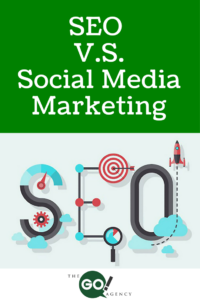If your brand has a website, you have probably heard of SEO. This concept is frequently mentioned, but rarely discussed in lay terms. What is it? How does it work? Why should you care? We’re here to break it down and help you understand how to make it work for you.
The What
Search Engine Optimization (a.k.a., SEO) is the process of optimizing the content of your website for search engines (shocking, we know). People rarely look past the first few pages of search engine (let’s be honest, of Google) results, so the closer your website is to the top of that first page , the better. SEO is considered “organic,” in that you are not paying a search engine for your rank.
The How
Ask yourself how much you really want to know about SEO, because there is a lot of information to unpack here. At first glance, SEO might appear to be an ice berg: small on the surface, gargantuan beneath the waves. In reality, SEO is more like an ant hill: it looks simple enough above ground, but that unassuming mound of dirt hides an extensive and intricate network of tunnels guarded by hordes of zealous soldiers.
What we’re trying to say is this: SEO is surprisingly complicated. Here is a very brief, very broad overview of SEO mechanics.
Search engines (almost all of them, anyway) index sites using crawlers, computer programs that continually browse the internet. As crawlers travel the world wide web, they index and catalog all of the information they find. The search engine’s algorithm then sorts the findings according to two criteria: relevance and popularity. Relevance is influenced by myriad factors, including external links, meta data, and citations. Popularity is a factor because the algorithm–much like middle school students–assumes that popularity is a good indicator of value. (Generally, that holds true.)
You optimize your search engine rankings by incorporating keywords and key phrases into your website and content. How do you know which words are key? Well, what are the most common search terms used by your customers? What do people type into the search bar when they’re looking for your industry, product, or service? Some of this seems like it would be common sense (for example, a gluten-free bakery would use keywords and phrases like “gluten-free,” “gluten-free ingredients,” “celiac,” et cetera), but there are other aspects that you might miss (e.g., there is often an overlap between gluten sensitivity and other dietary restrictions). Most people use keyword research tools such as Google’s Keyword Planner or Keyword Explorer from Moz. SEO is more than stuffing your website with keywords and calling it a day. You must carefully integrate keywords into your content.
By the way, remember the ant metaphor? Much like the angry soldier ants who fiercely protect their queen and kin, Google doesn’t play. If there are indications that you’re gaming the system (keyword stuffing, manipulating back links, or any other black hat nonsense), you will be penalized. The algorithm won’t literally attack you, but you’ll lose rank. There is no appeals process, either: the only way to regain your standing is to reform your SEO practices.
The Why
There is no logical reason to abstain from SEO. A well-designed website is using at least a few keywords anyway–the process of SEO just ensures that the best keywords are being used. A brand has no excuse to avoid this powerful tool.
Need help with your SEO? Yeah, you do. Contact us today for a free consultation!
Read More







